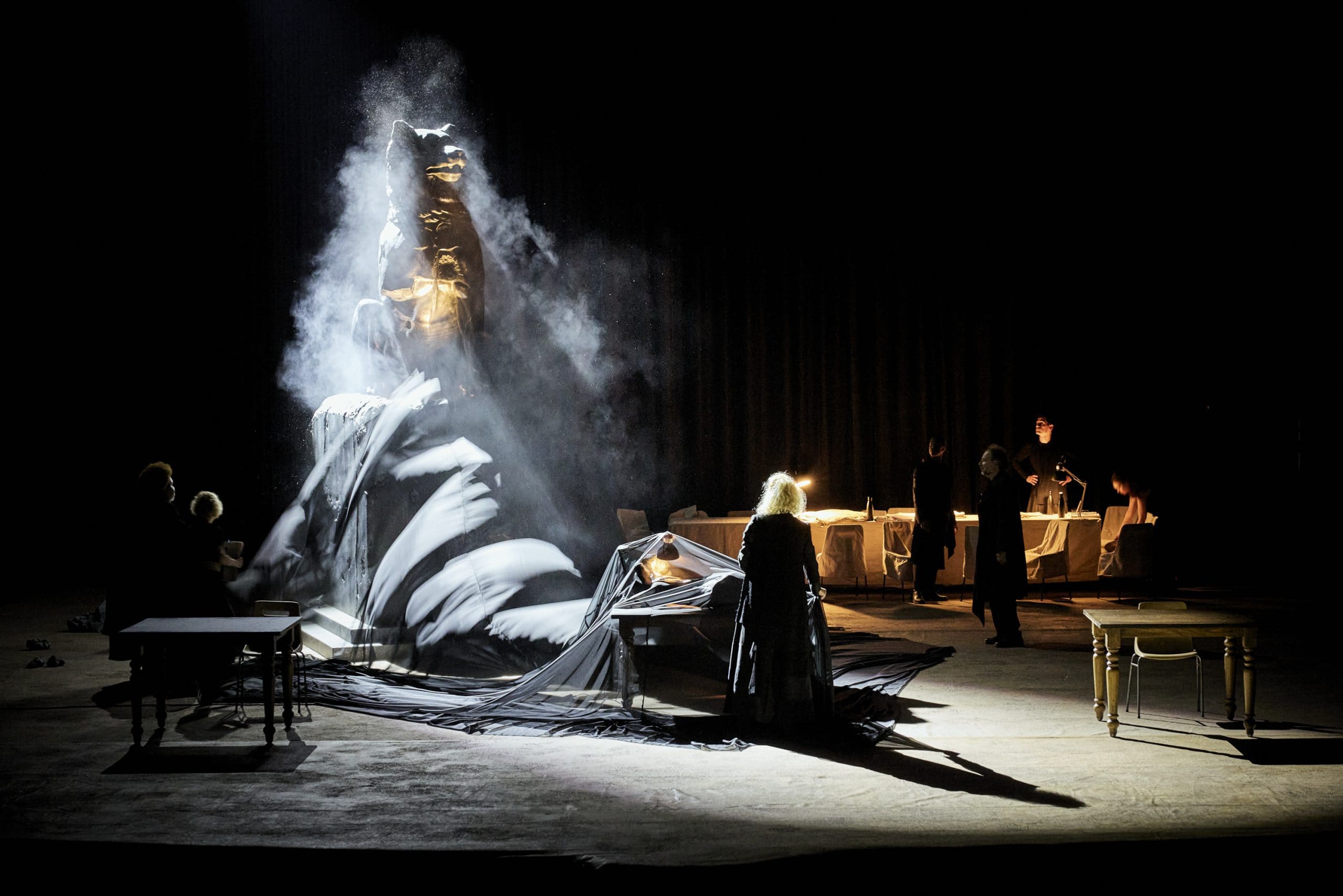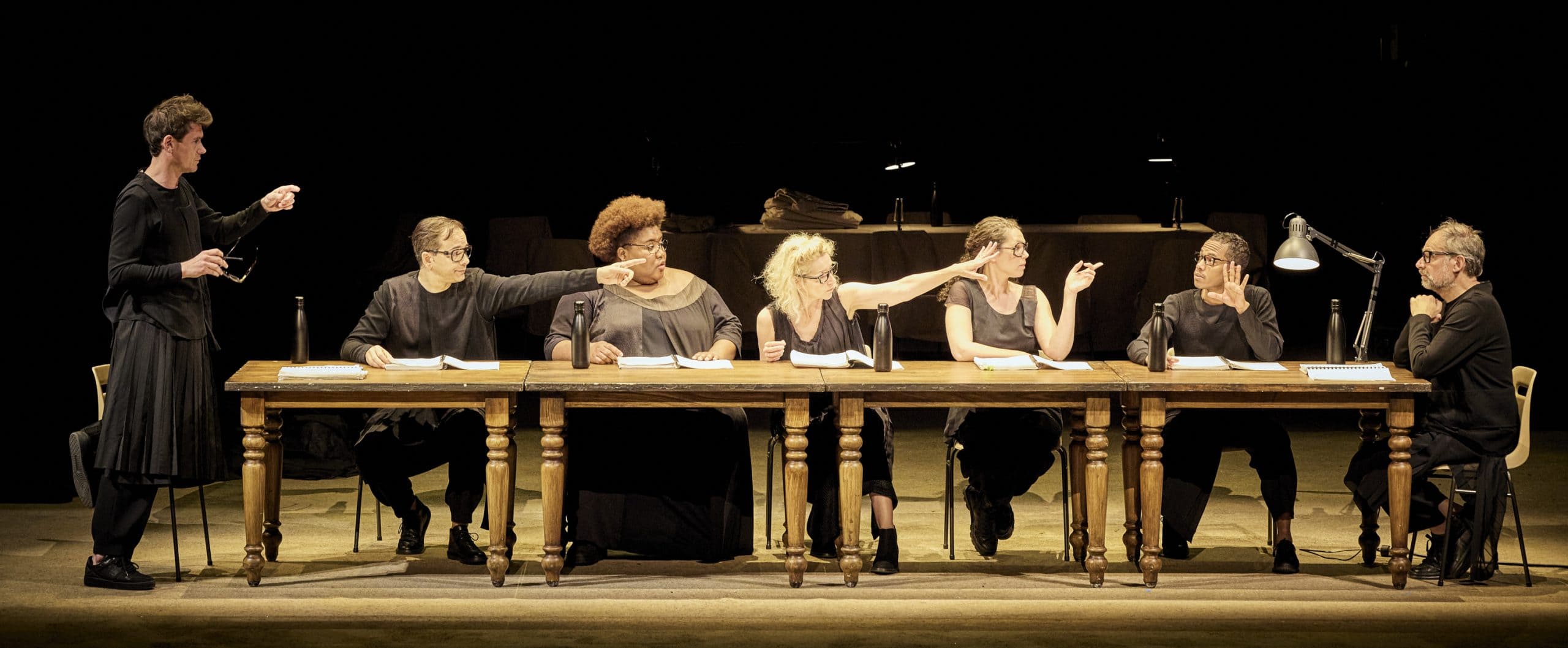Katsadima | Hecuba, not Hecuba
Ithink again on the reason why the ancient Greek culture has impacted a lot of people from different backgrounds through the ancient Greek tragedies until today. It does not happen because there is any form of superiority or deference to the past and philosophy. On the contrary, it does happen so as to be together; feel how it is to be together no matter what philosophical ideas might have created the first original plays.
The play Hecuba, Not Hecuba written and directed by Tiago Rodrigues that I saw at the Ancient Theatre of Epidaurus created such an atmosphere to go back to the books. The new approach of a known subject opens perspectives and engages the people. For this reason, first I decided which books to mention and then to write my text directly in English so as to be read by a wider audience. It is all about decisions.
Regarding books then, we can review the play starting from The Gods of the Greeks by Karl Kerényi-which I have read in Greek edited by Hestia publishers, Athens 2002 (1974) translated by Dimitris Stathopoulos-, then moving to Fredric Jameson, The political Unconscious, – Routledge Classics, isbn 9780415287517 (2002)- and to Miriam Leonard Athens in Paris, Ancient Greece and the political in post-war French thought -edited in Greek by Papyros publications, Athens 2008, translated by Elsa Vidali-.
I realize now how we are dependent on the archive bureaucracy every time we have to go further. From this standpoint, the process of the proper writing is also a rehearsal, whilst we show respect to the former pieces of writing and culture. And if this is true, what is writing? Is it only real? I doubt. Also, Tiago Rodrigues realized the ambiguities of writing and moving in between the lines. What we write shapes a kind of rehearsal and thus has a reference, phenomenologically.
Therefore, Tiago Rodrigues invented a double title for his play in a very clever way. Hecuba, Not Hecuba like hot/cold, I/ not I -to remember Beckett or/and Hamlet-, West/Orient and hello/goodbye. The title itself makes a good start for all the intellectual and emotional atmosphere that the French language can foster at the same time, in a unique way so as to retrace the romantic side of the people we were, born in love, tenderness and togetherness. This is all about the play of Tiago Rodrigues as a very general concept.
However, in relation to this open dialogue that Tiago Rodrigues founded through his play based on the principle of superposition, it is important not to forget Kitto Greek tragedy, Routledge Classics, isbn 9780415610193 (2011). In a parallel world of comparative literature, I will also add some verses of the Spanish poet Francisca Aguirre and try to translate them from Spanish -the original- into English, as her opinion about life has been inspired by Greek mythology too. Last but not least, Aragon Le mentir-vrai, Gallimard 1997, isbn 9782070403424- is another relevant book concerning the arguments on reality and its repercussions today.
More specifically, Laurent Muhleisen, literary advisor of the Comédie Française, pointed out the impact of superposition that Tiago Rodrigues developed into his play Hecuba, Not Hecuba after his encounter with the Greek thought and its role playing today. Superposition is based on the fact that the plot is divided into the classical tragedy and the new approach in relation to autism and how children face mistreatment and abuse in the special educational institutions.
Regarding the plot, the place is everywhere as it belongs to time; therefore, we are exposed to a time-space of which the rehearsal is the core and the process; the latter makes the tragedy past both functionable and real in terms of practicing. On the other hand, at the second part of the play, after the song “Try some tenderness” of Otis Redding, the place is transformed into a court scene. The tables are divided and we realize the contemporary battle of interests. The mother, the human side of the story has to fight the cosmic and political world where unfair incidents are of common repetition.
Analyzing the play, Nadia as a phantom of Hecuba is a contemporary woman and mother of Otis who was abused during his stay in an institution in Switzerland. At the pamphlet of the play Hecuba, Not Hecuba -edited in English and Greek by Athens Epidaurus Festival and the Artistic Director Katerina Evangelatos- it is mentioned that Tiago Rodrigues has been inspired by a true story of an autistic child. After reading and contacting some key persons he managed to turn it into a theatrical drama story.
How did Tiago Rodrigues accomplish his aim to keep the balance between past and future? First, he respected the myth of Evripidis according to which Hecuba is possibly transformed into a female dog in the end (I avoid writing bitch due to the wrong meaning the word has acquired in our times). Karl Kerényi is more precise on this and writes about a sea female dog.
Second, he respected the structuralism of multiple aspects such as the political, the social, and the existential one. Regarding Jameson, there is a functional interrelation of four levels: the anagogical – political reading, the moral-psychological reading, the allegorical – interpretive code and the literal-historical or textual referent. All these levels were covered in the play of Tiago Rodrigues. The economy or mode of production based on the tragic myth according to which Hecuba lost her last son Polydorus due to a friend’s betrayal and asked for Justice/revenge shed light on the current various interpretations of reality as well as on the critical questions of democracy about war entrepreneurship today.
According to the perceptions/interpretations of reality, Tiago Rodrigues managed to show the way we build our identity when we deny stereotypes, we go against the powerful line of power or we accept the defeat in terms of struggle. Hecuba/Not Hecuba is a character under construction. She is not just one thing. She is a role and a person, a woman and a mother, a voice and a body. Hecuba, Nadia is opposed to Chorus and tries to reinstate the truth for her son’s sake, whilst all the characters of the play demonstrate a concrete decision that defines their role on stage.
Although Hecuba, Not Hecuba was not created for Epidaurus only, this attempt to be staged here was more than efficient and productive. The simple stage setting of some wooden tables in a row and some black thermos on them was perfect to show the rehearsal environment as well as to imply the coffee society of democracy. It is known that cafes in Paris and elsewhere shaped people as free thinkers and political actors of social life (at least in the past). Moreover, the denial of Nadia/not Hecuba to drink some coffee has an answer in terms of semiotics. She says “no”, which means “I am not like you. I keep some distance”.
Going further, the efficiency of the stage direction is owed to the rehearsal status, the excellent interpretations of all the actors and especially of Elsa Lepoivre – Hecuba, Nadia and Loïc Corbery – Polymistor. The chorus acquired a Brechtian role to show us the story, which made the play exciting and political against any exotic and past exalting ways to face the ancient culture. What I liked more was the power given to Hecuba as another Antigoni who struggles for human; human itself without any noun.
And I thought deeper on the breathing and living presence of Nadia/Hecuba. Hecuba’s phantom is alive. She is a mother of many children lost, of Tempi children for example. She is a tragic symbol that the state denies regularly because of being guilty towards her. Hecuba/not Hecuba is a title of no name and all names together. That’s why I shudder to think of it.

According to the contrast Hecuba/not Hecuba, if we read Miriam Leonard, we will remember her argument that the French modernism was deeply impacted by such contrasts – e.g. Greek/Jew-. Therefore, many philosophers such as Levinas, Lacan, Derrida, Hélène Cixous, Vidal Naquet and Jean-François Lyotard applied that contrast diptych in their argumentative writing. In relation to the above, it is interesting to review the concept of individual ethics of Hecuba/not Hecuba in the analytical city of Socrates that Leonard depicts.
Some pieces of the puzzle of this reconsidered contemporary French thinking can be found in the play of Tiago Rodrigues. Esthetically, the presence of the foot of Hecuba’s son on the open stage can be seen as the fragment of the fragile statue of lost love, tenderness and togetherness. In terms of semiotics, this cut foot is the definite loss; it is the lost object of the beloved person converted into a shadow and a dream phantom. As a result, this cut foot is the exact difference that makes Hecuba/not Hecuba be a tragic figure.
At this point, we need to reread Kitto on Hecuba and the murder of the children as revolting (μυαρόν) so as to realize both the similarity and the difference of precondition regarding the plot. Kitto claims that Evripidis focused on the Chorus feeling “What will be our fate” instead of portraying Hecuba’s emotional state by their words. On the contrary, Tiago Rodrigues is more familiarized with Hecuba/not Hecuba emotions and writes on them and with them.
However, the common fact that unites Evripidis and Tiago Rodrigues is what Kitto writes about the causes of the misery of the play. They both agree on the fact that war and political necessity create misery. Tiago Rodrigues casts light on this dramatic climax too. He seems that agrees with Kitto who claimed that “the chorus is not indeed the hero of the action (..), but it is the focus of the tragic thought”. The emphasis on Hecuba justifies the concept that “the play derives its unity and power not from the symbol, but from the thing symbolized”.
Did I feel during the play? Yes, I did. After coming back to Athens I needed to make a story out of it, of what I had to throw back to reality. Every text is a matter of reality even though the outcome lies on various levels during the process.
But how do we deal with reality? Aragon puts it bluntly. The future realists will have to lie more and more so as to tell the truth, as the political sector includes and incorporates both taboo issues and names that the writers cannot use. As a consequence, the speech of freedom and reality is threatened. Through his vast writing, Aragon recalls the figure of Anna Karenina to conclude that she was a lost woman, descent and not guilty but beyond all hope.
This feeling of no hope and being lost in the boundaries of descent is also examined in the play Hecuba/Not Hecuba of Tiago Rodrigues. The writer-director Rodrigues seems to agree with Aragon even when the latter writes that Paris does not look like any other city where “the corpses stay on their feet”. Comparing this sentence with the coffee thermos and the black costumes of the seven actors of the Comédie Française – Eric Génovèse, Denis Podalydès, Elsa Lepoivre, Loïc Corbery, Gaël Kamilindi, Elissa Alloula and Séphora Pondi- on stage, we can deduce an elective affinity between them.
As a conclusion, the play Hecuba, not Hecuba opens an infinite dialogue with the drama application today. If I had to add some tips, I would possibly suggest a deep dark blue velvet tissue instead of the black nylon to be used at the scene of the female dog given that the myth implies a sea dog and thus the notion of the sea element and drapery could be demonstrated better. Another thing regards the linkage between the two parts that the music of Otis Redding “Try a little tenderness” joins together. I would need something more to be prepared for the next elaboration of the plot.
To put it shortly, Hecuba, not Hecuba of Tiago Rodrigues is a play of huge importance in our days for every society and country. It is not about a dream; it is about reality and coffee (free) democracy. It is about politics.
I decide to finish my text with some verses of Francisca Aguirre. I am going to cite some of her verses into English (the translation from Spanish is mine) of the poem “Frontera”/ Boundary:
I had to chop my heart into a thousand pieces
to pay my post in the desert
(..)
(Oh, Lord, how unforgivable:
to have been born extremely early
and have arrived extremely late).
I cite also some verses of the poem “Voices of silence”:
This is not the promised land she wished to:
The so much forbidden land of desire,
where the love longing grows like the waves
and this is all an interminable sea,
a huge plain that never stops,
because here nothing dies except for the immortal fear.
This last verse of Francisca Aguirre depicts more the atmosphere I felt during the play Hecuba/not Hecuba of Tiago Rodrigues. Needless to say, how I much I liked the experience even as a first impression. It is important to answer the question “did you like the play?” with a yes/no answer. Tiago Rodrigues and the Comédie Française set clear expectations and motivated the audience towards the importance on decisions.
Thoughts on the play Hecuba, Not Hecuba written and directed by Tiago Rodrigues
Comédie Française | First tour performance Ancient Theatre of Epidaurus





